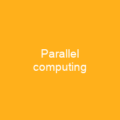What is Quantum Computing and Why Does It Matter?
Imagine a world where your computer can solve complex problems in seconds that would take classical computers years to crack. That’s the promise of quantum computing, a technology that leverages the unique properties of particles at the quantum level.
Quantum computing is not just about faster processing; it’s about solving problems that are currently beyond our reach. A qubit, the basic unit of information in a quantum computer, can exist in multiple states simultaneously—a phenomenon known as superposition. This allows for an exponential increase in computational power compared to classical bits.
Understanding Quantum Mechanics and Computing
The journey into quantum computing began with early research dating back to the 1920s and 1980s, when the fields of quantum mechanics and computer science started converging. This convergence led to breakthroughs in cryptography protocols, oracle problems, and encryption methods that are now central to secure communication.
Challenges and Breakthroughs
The physical engineering of high-quality qubits is a significant challenge due to the phenomenon known as quantum decoherence. However, this hasn’t stopped researchers from making remarkable progress. In 2019, Google AI and NASA achieved quantum supremacy, performing an impossible computation for classical computers with their 54-qubit machine.
The Quantum Circuit Model and Beyond
A quantum computer operates using a network of quantum logic gates and measurements. The CNOT gate is one such example, applying a NOT operation to the second qubit if the first qubit is in a specific state. Single-qubit operations like X, Y, and Z gates manipulate individual qubits.
Models of Quantum Computation
Different models of computation include gate arrays, measurement-based quantum computing, adiabatic quantum computing, neuromorphic quantum computing, and topological quantum computing. Each model has its unique approach to decomposing computation into a sequence of operations, but they are all equivalent to the quantum Turing machine.
Applications and Challenges
The potential applications of quantum computing span cryptography, cybersecurity, data analytics, artificial intelligence, optimization, simulation, and more. However, building large-scale quantum computers is fraught with challenges such as physical scalability, initialization, speed of quantum gates, universal gate set, qubit readability, and decoherence.
Decoherence and Error Correction
Decoherence times are typically short, ranging from nanoseconds to seconds at low temperatures. This makes long-term maintenance of qubits difficult. To combat this, error correction algorithms have been developed, but they come with their own overheads.
The Future of Quantum Computing
While the technology is still in its infancy, it’s clear that quantum computing holds immense potential. The race to build practical and scalable quantum computers continues, driven by both public and private sector investments. As researchers explore new tasks and techniques, the landscape of computation is poised for a revolution.
Conclusion
The journey into quantum computing is filled with challenges but also promises a future where complex problems are solved in ways we can only imagine today. Whether it’s breaking down cryptographic barriers or accelerating drug discovery, the potential applications are vast and exciting. As we continue to push the boundaries of what’s possible, one thing is certain: the world of computation will never be the same.

You want to know more about Quantum computing?
This page is based on the article Quantum computing published in Wikipedia (retrieved on February 20, 2025) and was automatically summarized using artificial intelligence.





